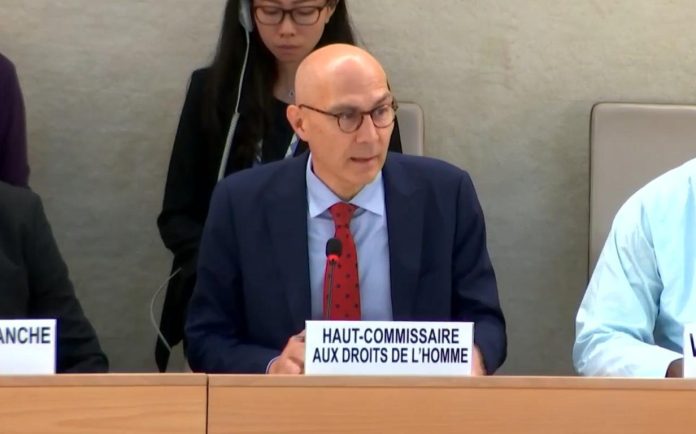The U.N. Commissioner for Human Rights Volker Türk said on Friday that fighting in Arakan State and escalating tension between ethnic Rakhine and Rohingya poses a “grave threat” to civilians. He claimed that there is a risk that past atrocities against the Rohingya community may be repeated.
“Rakhine State has once again become a battleground involving multiple actors, and civilians are paying a heavy price, with Rohingya at particular risk. What is particularly disturbing is that whereas in 2017, the Rohingya were targeted by one group, they are now trapped between two armed factions who have a track record of killing them,” he said.
Fighting in Arakan State in western Myanmar has intensified since the Arakan Army (AA) launched its latest offensive against the military on Nov. 13. The fighting has affected most townships, including in northern Arakan’s Maungdaw and Buthidaung, home to many Rohingya.
Türk also condemned reports that Rohingya are being forcibly recruited into the military to fight against the AA. “It is unconscionable that they should be targeted in this way, given the appalling events of six years ago, and the ongoing extreme discrimination against the Rohingya, including the denial of citizenship,” he stated.
There have been reports that the military is forcing Rohingya to burn Rakhine villages and ethnic Rakhine have allegedly torched Rohingya homes in response. Rohingya in Buthidaung and Sittwe townships have also accused the military regime of coercing them to protest against the AA.
The AA, an ethnic Rakhine armed organization, has also been accused by the U.N. and activists of stationing its troops in Rohingya villages. Twan Mrat Naing, AA commander-in-chief, has also spread unconfirmed allegations on social media that Rohingya “Islamic terror groups” are holding Buddhists and Hindus as hostages in Buthidaung.
“This was the same kind of hateful narrative that fuelled communal violence in 2012 and the horrendous attacks against the Rohingya in 2017,” added Türk. He called on countries that have influence over the military and AA to ensure that all civilians in Arakan State are protected.
Rohingya human rights activists also expressed alarm about the escalating violence in Arakan State.
“The military is employing conscripted Rohingya youth as human shields and guards. They also compel these youth to burn down houses in downtown Buthidaung and then propagate misinformation suggesting that Rohingyas are responsible for the arson. This tactic exacerbates misunderstandings between the Rakhine and Rohingya communities,” said Ro Nay San Lwin, the co-founder of Free Rohingya Coalition.
“Tensions are being stoked deliberately, with the intention of triggering more violence against the Rohingya population. The Myanmar military are trying to create a cascade of escalating communal tensions and violence in Rakhine State. It is a crude divide and rule strategy which will have deadly consequences,” said Tun Khin, the president of the Burmese Rohingya Organization U.K.
The Myanmar military launched operations in northern Arakan State in 2017 that forced over 700,000 Rohingya into Bangladesh in what has been labeled a genocide by the U.S. government. At least 600,000 Rohingya remain in Arakan State where they are denied citizenship and freedom of movement.



